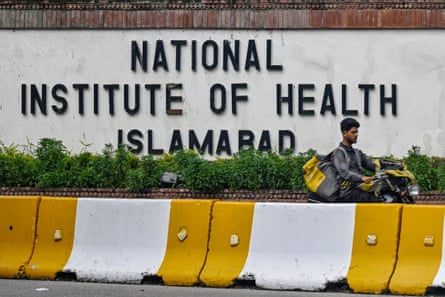Surveillance efforts against mpox are being ramped up globally, as trials for a new treatment showed disappointing results against the variant driving the current outbreak.
The European Centre for Disease Prevention and Control (ECDC) on Friday raised its risk level assessment for mpox, formerly known as monkeypox, from low to moderate. The decision came after Sweden reported the first case of clade Ib outside Africa.
Pakistan has also reported its first case of mpox, and China has announced it would begin screening travellers for the virus. The UK Health Security Agency said there were no cases of the virus in the UK and the risk was considered low but that planning was under way to prepare for any cases in the future.
The Stockholm-based ECDC said more imported cases to Europe were “highly likely”.
“Due to the close links between Europe and Africa, we must be prepared for more imported clade I cases,” ECDC director Pamela Rendi-Wagner said in a statement.
The World Health Organization on Wednesday declared the increase in mpox cases a public health emergency, after cases spread from the Democratic Republic of the Congo (DRC) to neighbouring countries.
The virus has two main variants – clade II was responsible for the 2022 global outbreak that mainly affected the gay and bisexual communities. Clade I is endemic in parts of Africa and has had a historically higher death rate. In a mutated form, Ib, it appears to be spreading between people in a sustained way for the first time, through sexual and non-sexual contact.
There have been more than 14,000 cases of mpox and 524 deaths reported in Africa so far this year, a total which already exceeds last year’s figures. Most of them are in the DRC.
A randomised, placebo-controlled trial of antiviral drug tecovirimat did not reduce the duration of mpox lesions among children and adults with clade I mpox in the country, according to results announced by the US National Institutes of Health on Thursday.
However, the death rate in the study – 1.7 % of the 597 participants, regardless of whether they received the drug or not – was lower than the overall death rate of 3.6% or higher reported elsewhere in the DRC.
The research team said this was likely to show the value of supportive medical care, particularly in hospitals.
Siga Technologies, which makes tecovirimat, said the results suggested greater improvement in people receiving it early in the disease course or with severe disease, which warranted further investigation.
Global health experts have called for more research of this kind to take place in the DRC, to fill significant gaps in scientific understanding of mpox. Dr Jonas Albarnaz, a research fellow specialising in pox viruses at the Pirbright Institute, said a big unknown was around the transmission dynamics of clade Ib.
“Is it more transmissible than other clade I viruses? Does it transmit preferentially via the sexual route? There is no evidence that this variant transmits better or causes a more severe disease than clade Ia. However, this may change as we learn more about this new variant.”
Humanitarian officials have said far more diagnostic kits, treatments and vaccines need to be shipped to Africa urgently. “There is a critical shortage of testing, treatment and vaccines across the continent. These shortages are severely hampering the ability to contain the outbreak,” said Bronwyn Nichol of the International Federation of Red Cross and Red Crescent Societies.

Dr Sania Nishtar, chief executive of Gavi, the vaccines alliance, said that any doses newly manufactured and bought would take at least six months to reach the DRC.
Gavi has been speaking to countries with large domestic stockpiles of the vaccine, such as the US and Japan, she said, and is waiting for a formal request from the DRC to mobilise a dose donation programme. About 65,000 doses are likely to be available in the short term via this route.
Danish drugmaker Bavarian Nordic, which produces one of the existing mpox vaccines, said it was seeking European approval to use its mpox vaccine in children aged 12 to 17. It is only approved for adults, although US regulators issued emergency approval for its use in teenagers during the 2022 global mpox outbreak.
On Thursday, Bavarian Nordic said it was ready to produce 10m vaccine doses by 2025 but was waiting for countries to place orders. It said it has about 500,000 doses in stock.
-
This article includes mention Gavi, of which the Bill & Melinda Gates Foundation were founding partners. Support for the Guardian’s global development journalism comes from the Bill & Melinda Gates Foundation via theguardian.org. Read more about how the Guardian ensures its editorial independence here
-
This article was amended on 16 August 2024 to remove reference to Pakistan having reported an mpox case in a patient returning from the UAE. This was based on a statement from a regional Pakistan health authority that was later withdrawn
Source: theguardian.com


















